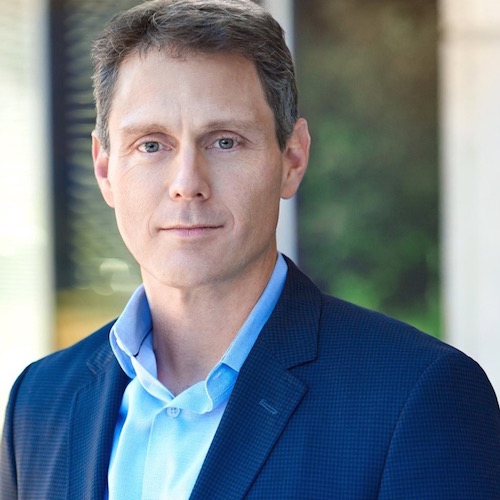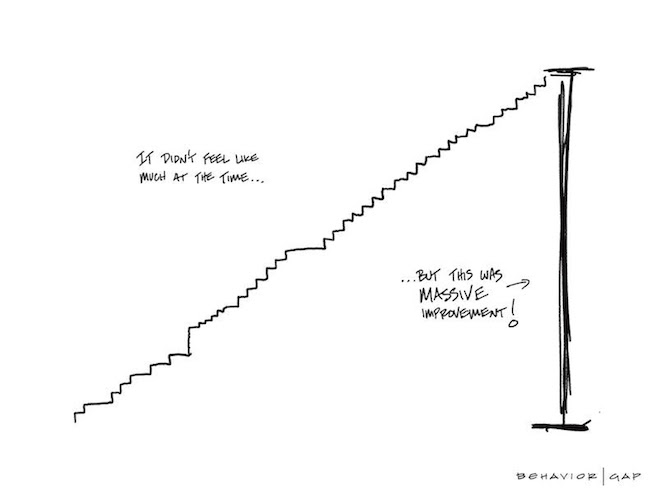Details Are Part of Our Difference
Embracing the Evidence at Anheuser-Busch – Mid 1980s
529 Best Practices
David Booth on How to Choose an Advisor
The One Minute Audio Clip You Need to Hear
Category: A piece we love
Investing at the Top – A Forbes Piece We Love

John Jennings, podcast guest, Chief Strategist, and President at The St. Louis Trust Company, recently wrote about why it’s okay to invest at the top of the market in his latest Forbes piece. He shares the story of two clients, one that took his advice and one that didn’t. Which client are you…Smith or Jones? Read the outcome here.
The Magic of Incremental Change

HIG friend, podcast guest, and NYT columnist, Carl Richards, shared the following story about how incremental change adds up if you take the long view. Keep reading for the story behind the sketch.
The Magic of Incremental Change
Back when I lived in Las Vegas, I used to ride road bikes with a semi-competitive group of riders. I remember when I first joined the group, it felt like a big victory if I could just keep up with them for the first 15 minutes. After a while, that became the first half-hour. Then an hour. One day, almost without even noticing it, I was suddenly able to stick with the pack for the entire ride.
It felt sudden at the time, but of course, it wasn’t. And although I was surprised, nobody else was, because they had all seen it before with other riders or experienced it themselves.
This is the sneaky power of incremental change.
Each day, you make a small improvement. Then, that becomes the new normal, and you get used to it. You make a small improvement again, and then that becomes the new normal. This happens over and over, slowly but surely. We barely notice we are getting closer to our goal, and then (again, seemingly “all of a sudden”) we’re there!
I didn’t feel a lot faster because I wasn’t a lot faster… compared to yesterday or even last week. In fact, I was just a little faster than I was last month. But month after month, ride after ride, it all added up. All those little bits of “faster” started to compound on top of one another.
Of course, this doesn’t just apply to riding bikes. I’ve had times in my career where I wondered if I was accomplishing anything. I specifically recall a time when I was working remotely for a large company. I got very little feedback on my work and was largely left alone. I loved the independence, but I also struggled because I had no idea if what I was doing was valued by the people I worked for.
To deal with this struggle, I started reviewing each week and noting what I had done. It felt weird at first because I didn’t want it to be seen as taking credit for things, but as the weeks added up and the list got longer, it felt good. I was doing stuff, and that stuff was making a difference, for sure.
No one else needed to see the list. It still felt good. It helped me to see, in real-time, how incremental changes add up.
If you build a process of reflecting every quarter, month, and year, you’ll never feel like you’re not accomplishing anything again. And while that may spoil some of the surprise of suddenly and unexpectedly arriving at your goal one day, I promise it will be worth it to feel much better along the way.
-Carl Richards
Stop and Ask Yourself…

We wanted to share a poignant excerpt from Jason Zweig’s latest piece for WSJ.
When anyone—in person, online or through an app on your phone—tries to push you into chasing an asset that had double-digit (or triple-digit!) returns last year, try answering this way: “Instead of that, what can you offer me that lost money last year?”
That silences the hype. That opens your mind to the kinds of neglected opportunities that often do best when last year’s market darlings fall from grace. And that keeps you from expecting the coming year to repeat the past year. They seldom do.
To learn more about how we would build your bespoke portfolio, schedule a call now.

